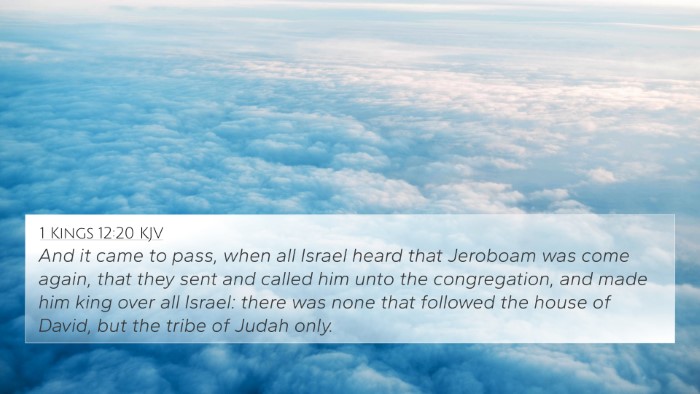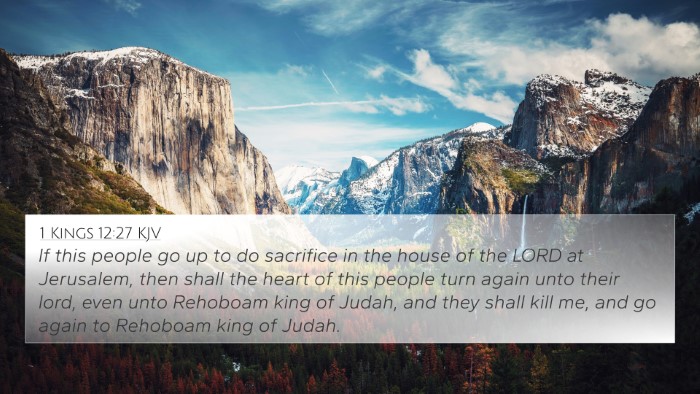Understanding 2 Chronicles 13:6
Verse (2 Chronicles 13:6): "Yet Jeroboam the son of Nebat, the servant of Solomon the son of David, is risen up, and hath rebelled against his lord."
Summary of Meaning
The verse in question showcases a significant turn in the history of Israel, marking the rebellion of Jeroboam against King Solomon's legacy. This rebellion leads to a split in the kingdom, propelling a series of events that unfold throughout the books of kings and chronicles. Such moments are pivotal as they illustrate the challenges of leadership, loyalty, and divine judgment.
Commentary Insights
Matthew Henry's Commentary
Matthew Henry emphasizes the character of Jeroboam as a servant who turns against his master, reflecting the nature of betrayal and ambition. This rebellion can be seen as a fulfillment of God's plan to divide the kingdom due to Solomon’s unfaithfulness. Solomon's heart turned from following God, which eventually led to judgement falling upon his house.
Albert Barnes' Commentary
Albert Barnes highlights the historical context of Jeroboam being chosen for this rebellion and the accompanying divine right attributed to the division. Jeroboam’s rise is seen as part of God's providence, giving the kingdom to another ruler as a consequence of Israel's disobedience. Barnes explicates the tragedy of a leader who commands great potential yet fails to govern humbly under God's authority.
Adam Clarke's Commentary
Adam Clarke discusses the significance of Jeroboam's lineage and his appointment by God as a means of punishment for the sins of Solomon. Clarke points out that the narrative illustrates God's sovereignty and judgment. The mention of Jeroboam serving Solomon juxtaposes the loyalty expected of a servant against the treasonous act of rebellion, which serves as a warning to all future leaders about the risks of pride and disobedience.
Related Bible Cross-References
- 1 Kings 11:26-40: This passage outlines the story of Jeroboam's rise to power and the prophetic warning regarding his leadership.
- 2 Chronicles 10:1-16: The account of Rehoboam's foolishness and the resulting division of the kingdom under Jeroboam's influence.
- 1 Kings 12:16-19: The response of the Israelites to Rehoboam's harsh leadership and their acceptance of Jeroboam as king.
- 1 Kings 14:7-16: The prophecy of Ahijah regarding the ruin of the house of Jeroboam due to idolatry.
- 1 Kings 15:30: The sins of Jeroboam are cited as the cause of God's judgment upon Israel.
- 2 Kings 17:22-23: A summary of Israel's disobedience leading to their exile and God's judgment on the nation.
- Hosea 8:4: A prophetic commentary on the events related to the kingdom divided under Jeroboam.
- Amos 7:10-13: A prophecy against Jeroboam, denoting the impact of his actions on Israel's future.
- Matthew 12:42: Jesus referring back to the wisdom of Solomon, contrasting it with the wise choices needed to lead according to God’s will.
- Romans 13:1: A New Testament perspective on authority that underscores the importance of submitting to God's ordained leaders, thereby reflecting on the consequences of rebellion.
Thematic Connections
The themes present in 2 Chronicles 13:6 echo throughout Scripture. They include:
- Betrayal: Seen in the actions of Jeroboam, reflecting the broader biblical theme of loyalty versus treachery.
- Divine Judgment: The consequences of turning away from God are sharply illustrated through Israel’s division.
- Leadership: The qualities of a good leader are contrasted with Jeroboam’s actions, serving as a cautionary tale.
- Prophecy and Fulfillment: The role of prophetic declarations that guide the narrative of Israel’s kings.
Conclusion
In analyzing 2 Chronicles 13:6, we see not just a king’s rebellion but the unfolding of God’s prophetic justice, the complex interplay of human authority and divine will. Understanding these connections enriches our reading of the Bible and underscores the importance of faithfulness in leadership. Through cross-referencing related verses within the Scriptures, we delve deeper into these themes, effectively linking the Old Testament with New Testament implications on authority, judgment, and hope.






